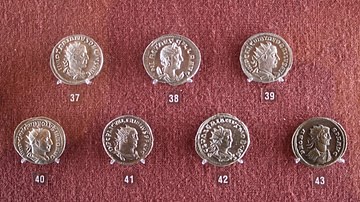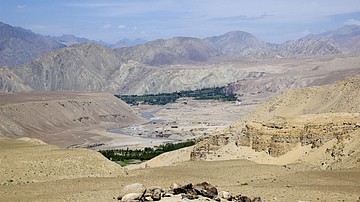Search
Search Results

Definition
Ancient Chinese Warfare
In ancient China warfare was a means for one region to gain ascendancy over another, for the state to expand and protect its frontiers, and for usurpers to replace an existing dynasty of rulers. With armies consisting of tens of thousands...

Definition
Parthenon
The magnificent temple on the Acropolis of Athens, known as the Parthenon, was built between 447 and 432 BCE in the Age of Pericles, and it was dedicated to the city's patron deity Athena Parthenos. The temple was constructed to house the...

Definition
Constantinople
Built in the seventh century BCE, the ancient city of Byzantium proved to be a valuable city for both the Greeks and Romans. Because it lay on the European side of the Strait of Bosporus, the Emperor Constantine understood its strategic importance...

Definition
Noah's Ark
Noah’s Ark is the boat that saved a generation of humans and animals when the God of Israel decided to destroy the human race by sending a great flood upon the earth. The story shares many elements with ancient, neighboring civilizations...

Definition
Amazon Women
In Greek mythology, the Amazons were a race of warlike women noted for their riding skills, courage, and pride, who lived at the outer limits of the known world, sometimes specifically mentioned as the city of Themiskyra on the Black Sea...

Definition
Shogun
The shoguns of medieval Japan were military dictators who ruled the country via a feudal system where a vassal's military service and loyalty was given in return for a lord's patronage. Established as an institution by the first shogun proper...

Definition
Roman Coinage
Roman coins were first produced in the late 4th century BCE in Italy and continued to be minted for another eight centuries across the empire. Denominations and values more or less constantly changed but certain types such as the sestertii...

Definition
Alaric
Alaric I (r. 394-410 CE) was a Gothic military commander who is famous for sacking Rome in 410 CE, which was the first time the city had been sacked in over 800 years. Although little of his family is known, we do know that he became the...

Definition
Attila the Hun
Attila the Hun (r. 434-453 CE) was the leader of the ancient nomadic people known as the Huns and ruler of the Hunnic Empire, which he established. His name means "Little Father" and, according to some historians, may not have been his birth...

Definition
Aryan
Aryan is a designation originally meaning “civilized”, “noble”, or “free” without reference to any ethnicity. It was first applied as a self-identifying term by a migratory group of people from Central Asia later known as Indo-Iranians (who...